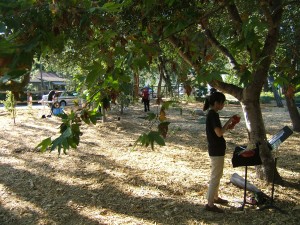[youtube]http://www.youtube.com/watch?v=kRmeEzvIyBY[/youtube]
Above: From the first European recording of the complete Ives Violin Sonatas, by János Négyesy and Cornelius Cardew
Those of us who knew him will miss his personal warmth and humor, and the joy he took in making music. This was originally posted by Rand Steiger on Facebook, and it’s so good I’m sharing here:
It is with deep sadness that I write to inform you that the great violinist János Négyesy passed away today due to complications that arose during cardiac surgery. Professor Négyesy was 75 and had been a member of the UCSD faculty since 1979. He is survived by his wife, Päivikki Nykter.
János Négyesy was born in Budapest, Hungary and studied at the Franz Liszt Academy of Music and later at Detmold in Germany. He left Hungary in 1965 and from 1970-74 was concertmaster of the Berlin Radio Orchestra. He lived and worked in Paris, Vienna and New York before joining the UCSD faculty in 1979. Long an advocate of new music, Mr. Négyesy appeared at major festivals throughout the world. In addition to performing, recording and teaching he wrote a definitive study of contemporary violin techniques, and was an innovative visual artist working with computer graphics.
Some of Négyesy’s landmark recordings included the first European recording of the complete Violin and Piano Sonatas of Charles Ives with pianist Cornelius Cardew and recordings of works specifically dedicated to him by important contemporary composers such as Attila Bozay, Carlos Fariqas, Vinko Globokar, Hans Otte, Isang Yun and his UCSD colleague Roger Reynolds.
Négyesy had a long friendship and collaboration with John Cage, who dedicated his piece One6 to him. Négyesy gave the world premiere of Cage’s Freeman Etudes I-XVI in Torino, Italy in 1984 and XVII-XXXII in Ferrara, Italy in 1991. He then produced a double CD of the complete Etudes in 1995 on Newport Classics Records. The complete Bartôk Duos for two Violins – with Päivikki Nykter – was released by Neuma Records in June 1993. Dedications – with solo works written especially for Mr. Négyesy by current and former UCSD students was released in June ’96 and a CD with solo compositions by Bartôk, Berio and Xenakis was released in Winter 2000, on Aucourant Records and Neuma Records, respectively.



